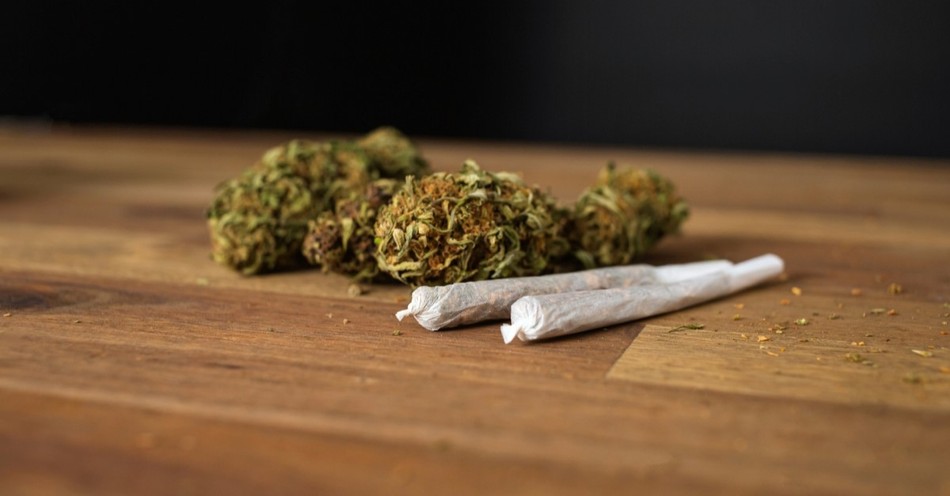“I smoke weed to relax.” “Stress is killing me, and weed is the only thing that helps.” “Smoking weed is no different than wine.” “Smoking weed calms me down so I’m a better person.” “Everyone needs an escape; smoking weed is mine. And besides, it’s legal.” As marijuana’s availability and popularity have grown, many of us hear comments like these (and not just by teens and young adults). On the surface, the reasoning appears slightly logical. In fact, it’s an attempt to justify behavior based on personal experience and desire. Christians look to the Bible for answers on right and wrong. So what does the Bible say when it comes to smoking weed? Is it forbidden? Even mentioned? If not, how do we know what’s best?
Disclaimer: this article discusses addictive substances, including alcohol and marijuana. It is not intended as a substitute for addiction counseling or expert mental health advice.
Does the Bible Mention Cannabis?
Even though the Bible never mentions cannabis, and despite centuries of credible Hebrew scholarship, a myth to the opposite persists. It began with twentieth-century Polish anthropologist Sula Benet (1903-1982), who studied Polish and Judaic customs. According to J. Alan Branch, in his article Cannabis is in the Bible?”: Debunking an Interpretative Myth, Benet used the text of Exodus 30:23-24, where Moses gives instructions for the ingredients in anointing oil. One of those ingredients is the Hebrew word, qanēh-bōśem, translated as “aromatic or fragrant cane.” Hebrew lexicon experts translate the term to mean balsam, but Benet switched the ingredient from balsam to cannabis with no hard evidence to back her assertion.
Throughout Benet’s lifetime, she published several articles asserting this belief. But as Branch points out, “the definitive Hebrew lexicon, The Hebrew and Aramaic Lexicon of the Old Testament, which says the term qanēh-bōśem is referring to a type of balsam oil. Balsam simply refers to aromatic resins derived from certain plants, and not cannabis.”
I asked Lois Tverberg (a Hebrew expert who has written several books, including Reading the Bible with Rabbi Jesus) if the term could be translated to cannabis. She confirmed cannabis is not one of the spices used in anointing oil. “‘Fragrant cane’ here is balsam, which is well known in the middle east,” she said. “It’s a spice used for perfume and is mentioned 30-plus times in the Bible. It is NOT cannabis.”
Misinformation and myths rely on the new, exciting, potent, and intriguing. The problem can be compounded by academics overreaching to provide new ideas. Academic research looks for new concepts or discoveries. If a scholar or researcher provides an intriguing but inaccurate new insight, sometimes the idea gains notoriety, as seen in Benet’s translation.
Despite Benet’s theory being shown false and disregarded, the myth that the Bible talks about cannabis persists today. As Brandt states, “Bad ideas used to support popular causes rarely go away quietly.”
Does the Bible Say Anything about Smoking Substances?
While there’s no specific reference to smoking weed in the Bible, we are instructed to value our physical bodies.
“Or do you not know that your body is a temple of the Holy Spirit within you, whom you have from God? You are not your own, for you were bought with a price. So, glorify God in your body.” (1 Corinthians 6:19-20).
“Therefore, I urge you, brothers and sisters, in view of God’s mercy, to offer your bodies as a living sacrifice, holy and pleasing to God—this is your true and proper worship.” (Romans 12:1)
As the Center for Disease Control explains, smoking marijuana alters our physiology and is potentially addictive, causing short and long-term damage to our bodies and mental health. Smoking weed is linked to several types of cancer, makes your heart beat faster, and raises blood pressure (potentially leading to heart attack and stroke). Like smoking tobacco, smoking weed harms the lungs and leads to lung damage.
Additionally, the effects of secondhand marijuana smoke are well-documented. Some known toxins include: “acetaldehyde, ammonia arsenic, benzene, cadmium, chromium, formaldehyde, hydrogen cyanide, isoprene, lead, mercury, nickel, and quinoline.”
Long and short-term negative effects of marijuana on the brain are many, including potentially lowering IQ and memory. In teens, weed inhibits brain development in the key areas of attention, memory, and learning.
What Does the Bible Say about Addictive Substances?
Ephesians 5:18 states, “Do not get drunk on wine, which leads to debauchery. Instead, be filled with the Spirit.” You don’t hear the word “debauchery” often today. Webster’s dictionary defines it as “extreme indulgence in bodily pleasures and especially sexual pleasures: behavior involving sex, drugs, alcohol, etc. that is often considered immoral.”
Substances lower our resistance and inhibitions no matter our maturity or moral beliefs. Something that seemed wrong and unsavory suddenly seems exciting, fun, and no big deal. This makes a person vulnerable and suspectable to the impulses of others, likely also under the influence. Definitely not acting in your best interest.
So while the Bible includes instructions for using wine beneficially, as we’re told in 1 Timothy 5:23 to use a little wine for stomach ailments, it’s clear that regular and habitual use is a problem. This occurs when an individual depends on the substance to feel good, get through the day, or craves the substance.
Interestingly, research indicates wine kills the bacteria that cause sore throats and dental plaque. Additionally, the academic journal Science observes that wine helps stomach issues by inactivating particular gastrointestinal viruses.
Even as the Bible allows for using wine beneficially, it repeatedly warns against drunkenness, as stated in Ephesians 5:18 and other verses.
“Likewise, teach the older women to be reverent in the way they live, not to be slanderers or addicted to much wine, but to teach what is good.” (Titus 2:3)
“But watch yourselves lest your hearts be weighed down with dissipation and drunkenness and care of this life, and that day come upon you suddenly like a trap.” (Luke 21:34)
The term “dissipation” means wasting your time on worthless activities. Like the overuse of wine, marijuana has a sedative effect. When mind-altering substances become addictive, life becomes less enjoyable, not more. Both wine and marijuana overuse are connected to depression (the very struggle users try to escape). The Alcohol Rehab Guide states, “Drinking becomes a way to escape reality and relax. Unfortunately, using alcohol to self-medicate depression can significantly impact physical and emotional well-being.” Certain strains of marijuana have been cited as causing “couch lock,” where the smoker feels so sedated they feel locked on the couch and can’t get up from it. This is true even in moderate usage.
When we look at a highly addictive substance like marijuana, it’s important to remember Romans 6:16:
“Do you not know that when you offer yourselves as obedient slaves, you are slaves to the one you obey, whether you are slaves to sin leading to death, or to obedience leading to righteousness?”
Any addiction becomes a compulsion, enslaving the user. It doesn’t start that way, but the substance or action gradually fills time and space within our being. If we want to live the abundant life Jesus came to give us (John 10:10), avoiding addiction is crucial.
How Can Christians Help Friends Who Are Addicted to Marijuana?
A friend shares with you her addiction to marijuana. Questions and thoughts flood your mind. How did this happen? You’re a good Christian woman! You know better. Why did you start in the first place? Don’t you know what the Bible says about addiction?
While normal, hold back these reactions and follow Jesus’ example with the Samaritan woman at the well found in John 4. Through the dialogue, we learn the woman has been divorced five times and is living with a man outside of marriage. Instead of challenging the woman with questions or making statements of judgment, Jesus asks questions that allow the woman to share her story. Then, Jesus leads the woman to the living water.
If a friend or relative trusts you with her story, make every effort to listen with the same kindness. If you cannot comprehend the stress and struggle of addiction or the decisions leading up to it, this is your opportunity to gain wisdom and grace as much as it is for the one with the addiction. Recognize the need for wisdom and ask for it (James 1:5) so you can carry another’s burden (Galatians 6:1-2).
Allow your friend to confess sins and pray for healing. Remember that it is the work of the Holy Spirit to judge and yours to show mercy. We are admonished in Ephesians 4:32, “Be kind and compassionate to one another, forgiving each other, just as in Christ God forgave you.” And James 2:13 reminds us, “judgment without mercy will be shown to anyone who has not been merciful. Mercy triumphs over judgment.”
On a practical level, be present. Ask the individual if there is any specific support you can provide. It may help to provide distractions and activities, like taking walks in the fresh air. Offer resources that might be beneficial.
Throughout your journey together, remember James 5:15-16: “And the prayer offered in faith will make the sick person well; the Lord will raise them up. If they have sinned, they will be forgiven. Therefore confess your sins to each other and pray for each other so that you may be healed. The prayer of a righteous person is powerful and effective.”
Join our discussion on Crosswalk Forums!
Photo Credit: Getty Images/24K-Production
Ann Vande Zande is a writer, speaker, mentor, and adjunct professor. She enjoys all things outdoors for three seasons in Minnesota, and all things indoors in the cold long one. She’s fortunate to have shared her story and teaching in Focus on the Family Magazine, In Touch, Proverbs 31 Woman, Bible Advocate, and more.
This article is part of our Bible resource for understanding the significance and meaning of biblical phrases and ideas. Here are our most popular Bible articles to grow in your knowledge of God's Word:
Promises of God in the Bible
Is "This Too Shall Pass" in the Bible?
What Was the Ark of the Covenant?
Top 10 Bible Stories for Kids
“Iron Sharpens Iron” in Proverbs 27:17
"Fearfully and Wonderfully Made" in Psalm 139
“Be Still and Know That I am God” in Psalm 46:10
"No Weapon Formed Against Me Shall Prosper" - Isaiah 54:17



